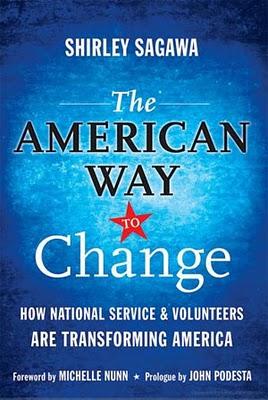The American Way to Change: How National Service and Volunteers Are Transforming America

Mom. Apple pie. Service. In The American Way to Change, Shirley Sagawa convincingly argues that volunteering is both deeply rooted in American history, as well as a creative solution to modern societal challenges. Sagawa argues that service can be used to impact many entrenched social ills, including an ineffective public education system, an aging population with fewer family support systems, environmental degradation, and poverty. Service—whether through a national program like AmeriCorps or through individuals working at volunteer-run organizations like Citizen Schools—is a critical component to a functioning civil society, according to Sagawa, and fill gaps between programs offered by the government, businesses, and nonprofits.
Over nine concise chapters, Sagawa outlines American volunteer service and its impact on the people serving, the communities being served, and the nation at large. This impact is not just due to the net social good that's being enacted through these programs, but also through the innovations that result from passionate people dealing with real challenges with limited resources. She also describes the people who serve, who are mostly people in transition: college graduates, retirees, and the recently jobless, among others.
Sagawa, who has been called "the mother of the modern service movement," is a very credible author, and The American Way to Change isn't pure conjecture about the impact volunteers and service organizations could have on the big issues facing America. She describes, at length, the impact of the volunteer-based programs that are presently working in prose both matter-of-fact and moving. For instance, one successful venture is the Prisoner Entrepreneurship Program, which combats recidivism through teaching basic business skills to the incarcerated. Founded by a former Wall Street investor, the program has a return-to-prison rate of less than ten percent, and an employment rate of eighty percent within thirty days of release. This is one of literally dozens of programs that Sagawa profiles that are both very successful and have concrete results that help solve some of America's biggest challenges.
In this fast-moving book, Sagawa makes a strong case for service no longer being considered something "nice" done to pad a resume or pass an afternoon, but an absolutely necessity in changing the United States for the better. Buy it if you're passionate about service, looking for organizations to volunteer with that are making a substantial difference, or simply in need of inspiration about the power of human potential.
Voluntarism seems good, but it's really just an ideology. With some exceptions, only middle class can really afford to do volunteering. Then these people get praised for being "agents of change." This kind of work needs to be done, but why does it have to be separate from work as such? Work should be about the betterment of society, not just the pursuit of private economic profit. Voluntarism is at best a band aid to larger problems, rather than a viable solution.
For us feminists there is a great new video home, http://nist.tv, for all things feminist content on moving images. It was created by a young woman through Americacorps.